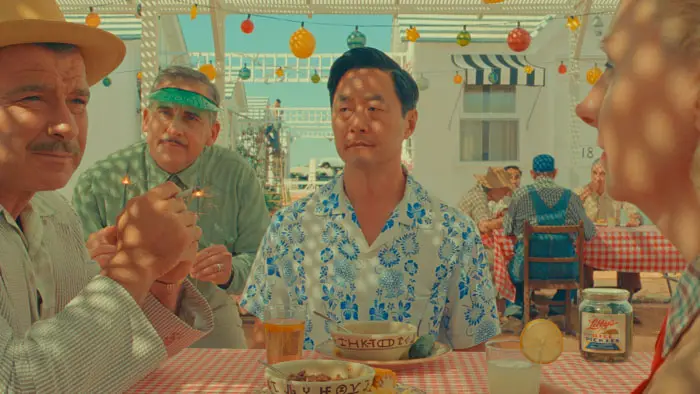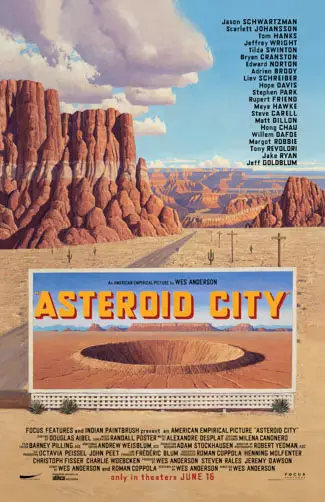
The twin plots and many subplots of Asteroid City all center around relationships and creation. Hanks lends himself well to Anderson and Coppela’s material as Augie’s father-in-law. Johannson and Schwartzman share a perfect world-weariness and provide commentary on their character’s motivations and complexity. Johansson alone plays a character in a production about a TV broadcast of a play (created solely for said broadcast). She is actually an actress preparing for a role. The whole cast helps create the memorable, whimsically idiocentric atmosphere that shined so well in Grand Budapest Hotel. As Act II begins to close, the movie reminds the audience how much is centered around the characters and those bringing these characters to the screen.
Title cards announcing each scene or new act are just one of the many ways Anderson and Coppola focus on performance and production. If The French Dispatch was a love letter to art, journalism, and world culture, then this is a love letter to acting, writing, and the space age. Like Anderson’s prior work, there’s a lot of visual delight, continuing his mantra of symmetrical framing, vibrant colors, and extensive set pieces. The story comments on the labors of production, casting, and actors attempting to tap into their character’s psyche. Everything from the story to how Anderson tells his narratives feels like the freedom of indie filmmaking inside the production of an Anderson picture. It’s a movie for cinephiles; Anderson, Coppola, and the whole cast and crew know it.

(L to R) Liev Schreiber as “J.J. Kellogg”, Steve Carell as “Motel Manager”, Stephen Park as “Roger Cho”, and Hope Davis as “Sandy Borden” in writer/director Wes Anderson’s ASTEROID CITY, a Focus Features release. Credit: Courtesy of Pop. 87 Productions/Focus Features
“…vibrant colors, and extensive set pieces.”
Wishing to do something worthwhile is a major theme of Asteroid City. Young Woodrow even proclaims this idea to Swinton’s Dr. Hickenlooper, but the message is as much to the viewer as it is to the characters and the characters they are playing. The multiple threads are secondary to the characters and the realizations they have with each other within a fictional play on a fictional broadcast in a very real film.
Moments might be haphazard and even a little too stream of consciousness to make sense of, even with repeated viewings. However, Asteroid City stays with you. Playing the director of the fictional play, Adrian Brody, states, “It doesn’t matter, just keep telling the story.” This serves as a strong thesis for everything that happens on screen. Even in the more chaotic moments, the filmmaker still delivers a beautiful, exciting, and interesting movie in a way only Wes Anderson could.

"…doesn't matter, just keep telling the story."



I started watching this movie knowing that Chris was right and Alan was wrong. I was wrong. Chris was wrong. We were very wrong. Alan was entirely correct. Asteroid City is not just a bad Wes Anderson movie…it’s a bad movie. I turned it off after about 20 minutes. Unlike other Anderson movies where every character was uniquely quirky…in Asteroid City, every character was monotonously, identically, quirky. Other movies told a story. This one felt like identically quirky dialogue was being forced from the lips of as many different looking characters that could fit on the screen. Maybe there was a story worth watching, but I will never know because I will never finish watching.
Other Anderson movies had me anxious to discover the madness sure to come in the next scene. This movie had me anxious to turn it off. It was like trying to sit thru the dreck that was Valerian, after loving The 5th Element so deeply. It seemed impossible that the person who created the previous movie, also created this spit in the eye of what came before.
I’m not so much angry as disappointed. Very Disappointed.
Very perceptive, sir!
I am just sorry that you had to sit through the entire movie. I shudder in sympathy at the hell you put yourself through for your craft. That may have been too extreme for what the concept of ‘taking one for the team’ can expect from one person.